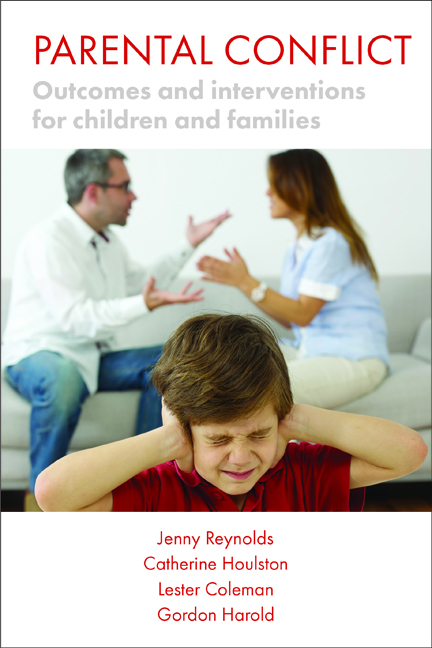Book contents
- Frontmatter
- Contents
- Foreword
- Preface
- 1 Conflict in context
- 2 Understanding different types of conflict
- 3 The impact of inter-parental conflict on children
- 4 How does inter-parental conflict affect children?
- 5 Risk and resilience: why are some children affected more than others?
- 6 Review of conflict-based interventions for couples
- 7 Implications for practice: How to help families
- 8 Conclusions and recommendations
- References
- Index
5 - Risk and resilience: why are some children affected more than others?
Published online by Cambridge University Press: 04 February 2022
- Frontmatter
- Contents
- Foreword
- Preface
- 1 Conflict in context
- 2 Understanding different types of conflict
- 3 The impact of inter-parental conflict on children
- 4 How does inter-parental conflict affect children?
- 5 Risk and resilience: why are some children affected more than others?
- 6 Review of conflict-based interventions for couples
- 7 Implications for practice: How to help families
- 8 Conclusions and recommendations
- References
- Index
Summary
Conflict between parents can have a long-lasting impact on children's wellbeing and development. However, as noted in Chapter 1, some children may be exposed to similar levels of hostility and aggression between parents and remain relatively unscathed by it. A comprehensive understanding of the impact of parental conflict therefore requires consideration as to why some children are more vulnerable to its impact than others. Moreover, identifying the mechanisms that explain why some children experience serious difficulties in the context of inter-parental conflict, while other children seem relatively unaffected (i.e. resilient) enables us to develop more effective support targeted at children and families most vulnerable and at risk.
This is vividly demonstrated by research into the processes occurring within the family when families experience economic pressure; a recognised risk factor for children (Conger et al., 1999). According to one well-supported theoretical model, under the strain of economic pressure parents are vulnerable to developing depression. Parental depression increases the likelihood of increased conflict and violence between parents, which in turn undermines parenting, thereby increasing the risk of children developing mental health difficulties (Conger et al., 1994). The theoretical model highlights the role of inter-parental conflict as a mediator, or vehicle through to harsh parenting practices, which in turn influence children's psychological outcomes as a result of the emotional strain of coping with difficult financial circumstances. This model focuses on economic pressure, but similar processes can apply in the case of other risk factors (e.g. parental divorce). These carefully researched explanatory models are helpful in isolating and understanding, not only the factors that may trigger increased inter-parental conflict, but also in understanding how inter-parental conflict as a factor in and of itself helps to explain poor developmental outcomes for children.
This chapter explores those factors which leave some children at risk and others resilient to the impact of conflict between parents. These factors are divided into i) the characteristics of the child, ii) characteristics of the family (including generational cycles of conflict), and iii) social, cultural or other factors outside of the family.
Child characteristics
Sex of parent and sex of child
The sex of the child and the sex of the parent and how these interact are all factors that may help to explain why some children fare better than others. Some early research appeared to suggest that boys may be more vulnerable to the impact of inter-parental conflict than girls.
- Type
- Chapter
- Information
- Parental ConflictOutcomes and Interventions for Children and Families, pp. 51 - 76Publisher: Bristol University PressPrint publication year: 2014



